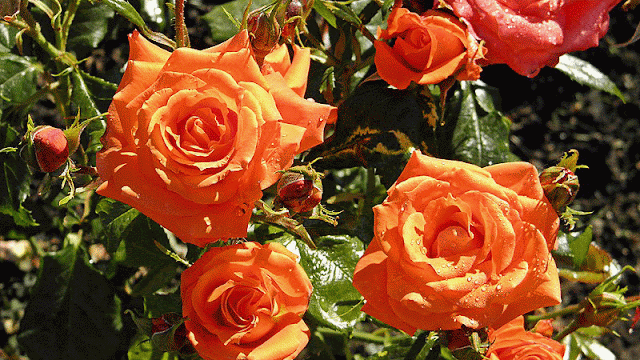How to Control White Flies on Rose Plants?
Tips to Control White Flies on Rose Plants
Roses are one of the most popular and beloved flowers around the world. They are known for their beauty, fragrance, and versatility, and are often used to express love, appreciation, and gratitude. However, growing roses can be a challenging task, as they are susceptible to a wide range of pests and diseases. One of the most common pests that rose growers encounter is the white fly. White flies are tiny, sap-sucking insects that can cause severe damage to rose plants if left untreated. In this article, we will provide a comprehensive guide on how to control white flies on rose plants.
What are White Flies?
White flies are tiny, winged insects that belong to the family Aleyrodidae. They are about 1/16 inch long and have a white, powdery appearance. They are commonly found on the undersides of leaves, and their presence can be identified by the sticky, sugary substance called honeydew that they excrete. White flies are sap-sucking insects, and they feed on the phloem sap of plants, which can lead to stunted growth, yellowing of leaves, and premature leaf drop.
Why are White Flies a Problem for Rose Plants?
White flies are a significant problem for rose plants because they can cause severe damage if left untreated. They can weaken the plant by sucking the sap, which can result in stunted growth, yellowing of leaves, and premature leaf drop. In addition, white flies can transmit plant viruses, which can further weaken the plant and affect its overall health. If left unchecked, white flies can cause irreparable damage to rose plants, resulting in poor growth, diminished flower production, and even death.
How to Identify White Flies on Rose Plants?
Identifying white flies on rose plants can be challenging, as they are tiny and difficult to spot with the naked eye. However, there are a few signs that can help you identify their presence. One of the most obvious signs is the sticky, sugary substance called honeydew that they excrete. Honeydew is a clear, sticky substance that can be found on the leaves and stems of rose plants. Another sign is the presence of sooty mold, which is a black, powdery substance that grows on the honeydew. Sooty mold can also be found on the leaves and stems of rose plants and can be a sign of a severe infestation.
How to Control White Flies on Rose Plants?
There are several methods for controlling white flies on rose plants, ranging from natural remedies to chemical treatments. Here are some of the most effective methods:
Natural Remedies
One of the most effective natural remedies for controlling white flies on rose plants is to introduce natural predators that feed on them. Ladybugs, lacewings, and parasitic wasps are natural predators of white flies and can be introduced to the garden to control their population. Another natural remedy is to use insecticidal soap, which is a safe and effective way to control white flies on rose plants. Insecticidal soap works by disrupting the insect's cell membranes, causing them to dehydrate and die.
Horticultural Oils
Horticultural oils, such as neem oil and mineral oil, can be used to control white flies on rose plants. These oils work by suffocating the insects, and they can be applied directly to the plant using a spray bottle or a garden sprayer. Horticultural oils are safe to use and do not harm beneficial insects or the environment.
Chemical Treatments
Chemical treatments, such as insecticides, can also be used to control white flies on rose plants. However, it is essential to use them with caution, as they can harm beneficial insects and the environment if not used properly. Always read the label and follow the instructions carefully when using chemical treatments. Some of the most common insecticides used to control white flies on rose plants include pyrethroids and systemic insecticides. Pyrethroids work by disrupting the nervous system of insects, causing them to die, while systemic insecticides are absorbed by the plant and provide long-lasting control.
Cultural Control
Cultural control methods can also be used to control white flies on rose plants. These methods include maintaining proper plant hygiene by removing dead leaves and debris, pruning and shaping the plant to improve air circulation, and using reflective mulches to deter white flies. It is also essential to avoid over-fertilizing rose plants, as this can attract white flies and other pests.
Preventing White Fly Infestations
Preventing white fly infestations is the best way to control them on rose plants. Here are some preventive measures that can be taken:
- Inspect new plants carefully before bringing them home to ensure they are free of white flies and other pests.
- Avoid over-fertilizing rose plants, as this can attract white flies and other pests.
- Maintain proper plant hygiene by removing dead leaves and debris.
- Prune and shape the plant to improve air circulation and light penetration.
- Use reflective mulches to deter white flies.
- Introduce natural predators, such as ladybugs, lacewings, and parasitic wasps, to control white fly populations.
White flies can be a significant problem for rose plants, but they can be controlled using natural remedies, horticultural oils, chemical treatments, and cultural control methods. Preventing white fly infestations is the best way to control them on rose plants. By following the preventive measures and control methods mentioned in this article, rose growers can effectively control white flies and ensure healthy, vibrant rose plants. Remember to always read the label and follow the instructions carefully when using chemical treatments, and avoid using them as a first option. Natural remedies and cultural control methods are often effective and safer alternatives for controlling white flies on rose plants.



